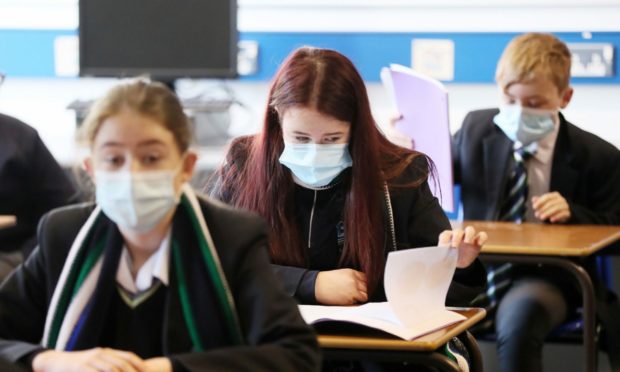Pupils in Scotland have lost out on a third of their schooling since the pandemic started, even once remote learning is taken into account, new research has found.
Researchers from the London School of Economics and Political Science (LSE) and the University of Exeter found that Scottish pupils lost an average of 64 days of schooling between March 2020 and April 2021.
This is slightly higher than in England and Northern Ireland, with pupils in these nations losing an average of 61 days of schooling in the same period.
However Scotland’s figures are lower than Wales, with the research showing pupils there lost an average of 66 days.
The usual school year is 190 days.
How do the numbers look by term?
The research report notes that that overall, “learning capacity due to the closure of schools during the first lockdown in 2020 fell sharply for all four nations”.
Losses were particularly large for Scotland and Wales, where on average pupils missed out on two thirds (66 percent and 64 percent respectively) of the lessons they would normally receive.
Although “sizeable learning losses” occurred during the second round of school closures across the UK in early 2021, the report noted that these were lower than those experienced during the first school closures in 2020.
Overall, pupils in Scotland lost an average of 39 school days during the summer term last year; an average of seven days during the Autumn term 2020 and an average of 18 days during the spring term 2020.
Is deprivation a factor?
The analysis also shows that in each of the four nations of the UK, poorest pupils lost more academic learning time than their richer peers.
Although the report did not give specific data for Scotland (due to “relatively small sample sizes”), it did offer a comparison between England and the rest of the UK.
“Learning losses suffered during the pandemic are manifested in stark gaps in attainment between children from poorer backgrounds and their more privileged counterparts.”
LSE professor Stephen Machin, CEP director and co-author of the report
During the 2021 school closures, the poorest pupils in England missed out on a third of their academic learning (34.9 percent) while the richest pupils missed out on a quarter of their academic learning (24.4 percent).
This 10.5 percentage point gap is similar in scale to the 8.8 percentage point gap observed in the rest of the UK.
“Quick action is needed”
Lee Elliot Major, professor of social mobility at the University of Exeter and report co-author, said: “Our analysis reveals that pupils’ learning loss varies between the four home nations, partly due to historical differences in school term times and partly as a result of school closure policies.
“This shows that ministers can make a difference – but quick action is needed.”
“Our analysis reveals that pupils’ learning loss varies between the four home nations.”
Lee Elliot Major, professor of social mobility at the University of Exeter
LSE professor Stephen Machin, CEP director and co-author of the report, added: “Even a few days extra learning loss can have a large impact on educational achievement and life outcomes, and these are big losses of around 60-65 days.
“Learning losses suffered during the pandemic are manifested in stark gaps in attainment between children from poorer backgrounds and their more privileged counterparts, which is likely to cause a significant decline in social mobility for younger generations.”










